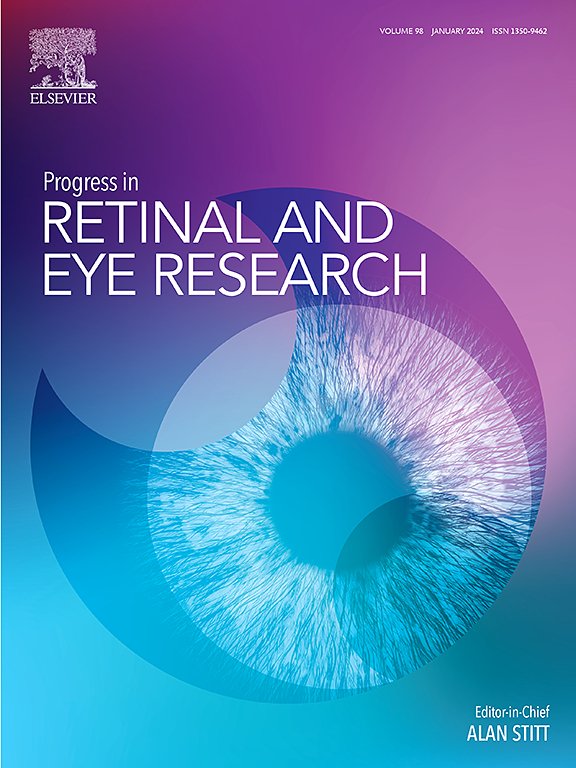Eye on the horizon: The metabolic landscape of the RPE in aging and disease
IF 14.7
1区 医学
Q1 OPHTHALMOLOGY
引用次数: 0
Abstract
To meet the prodigious bioenergetic demands of the photoreceptors, glucose and other nutrients must traverse the retinal pigment epithelium (RPE), a polarised monolayer of cells that lie at the interface between the outer retina and the choroid, the principal vascular layer of the eye. Recent investigations have revealed a metabolic ecosystem in the outer retina where the photoreceptors and RPE engage in a complex exchange of sugars, amino acids, and other metabolites. Perturbation of this delicate metabolic balance has been identified in the aging retina, as well as in age-related macular degeneration (AMD), the leading cause of blindness in the Western world. Also common in the aging and diseased retina are elevated levels of cytokines, oxidative stress, advanced glycation end-products, increased growth factor signalling, and biomechanical stress – all of which have been associated with metabolic dysregulation in non-retinal cell types and tissues. Herein, we outline the role of these factors in retinal homeostasis, aging, and disease. We discuss their effects on glucose, mitochondrial, lipid, and amino acid metabolism in tissues and cell types outside the retina, highlighting the signalling pathways through which they induce these changes. Lastly, we discuss promising avenues for future research investigating the roles of these pathological conditions on retinal metabolism, potentially offering novel therapeutic approaches to combat age-related retinal disease.
地平线上的眼睛:老化和疾病中 RPE 的代谢状况。
为了满足光感受器巨大的生物能需求,葡萄糖和其他营养物质必须穿过视网膜色素上皮(RPE),RPE 是位于视网膜外层和脉络膜(眼睛的主要血管层)之间的极化单层细胞。最近的研究揭示了视网膜外层的新陈代谢生态系统,感光器和 RPE 在其中进行着复杂的糖、氨基酸和其他代谢物的交换。这种微妙的新陈代谢平衡已在老化的视网膜以及老年性黄斑变性(AMD)中被发现受到干扰,而老年性黄斑变性是西方世界失明的主要原因。在老化和患病的视网膜中,细胞因子、氧化应激、高级糖化终产物、生长因子信号增加和生物力学应激水平升高也很常见,所有这些都与非视网膜细胞类型和组织的代谢失调有关。在此,我们将概述这些因素在视网膜稳态、衰老和疾病中的作用。我们将讨论它们对视网膜以外组织和细胞类型中葡萄糖、线粒体、脂质和氨基酸代谢的影响,并重点介绍它们诱导这些变化的信号通路。最后,我们讨论了未来研究这些病理条件对视网膜新陈代谢的作用的前景广阔的途径,这有可能为防治与年龄有关的视网膜疾病提供新的治疗方法。
本文章由计算机程序翻译,如有差异,请以英文原文为准。
求助全文
约1分钟内获得全文
求助全文
来源期刊
CiteScore
34.10
自引率
5.10%
发文量
78
期刊介绍:
Progress in Retinal and Eye Research is a Reviews-only journal. By invitation, leading experts write on basic and clinical aspects of the eye in a style appealing to molecular biologists, neuroscientists and physiologists, as well as to vision researchers and ophthalmologists.
The journal covers all aspects of eye research, including topics pertaining to the retina and pigment epithelial layer, cornea, tears, lacrimal glands, aqueous humour, iris, ciliary body, trabeculum, lens, vitreous humour and diseases such as dry-eye, inflammation, keratoconus, corneal dystrophy, glaucoma and cataract.

 求助内容:
求助内容: 应助结果提醒方式:
应助结果提醒方式:


